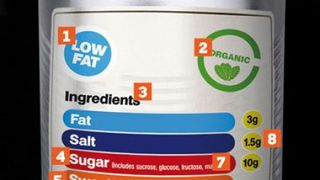Food label laws
Nutrition expert Sam Montel from the Food Standards Agency explains what food labels really mean

1 Low fat
By law, foods labelled ‘low fat’ must contain 3g fat or less per 100g or 1.5g or less per 100ml. Foods can be called ‘fat free’ if they have less than 0.5g fat per 100g, but these can be very high in sugar.
2 Organic
Organic products must be made of at least 95 per cent organic ingredients. They must not have been produced using unapproved artificial chemical fertilisers or pesticides.
3 Ingredients list
Ingredients are listed in order of weight, so whichever ingredient there is most of comes first on the list and whichever had least is the last. All additives and flavourings must also be listed.
4 Sugar
Keep your intake of foods with more than 15g sugar per 100g to a minimum, unless they occur naturally from fruit or milk. Total sugars can be found under the carbohydrates on the nutrition panel as ‘Carbohydrates (of which sugars)’.
5 Artificial sweeteners
Although there has been some controversy over these in the past, all sweeteners must now be approved by the European Commission (EC) and listed in the ingredients list.
6 ‘Use by’ date
‘Use by’ dates are found on foods that go off quickly, such as meat, soft cheese and fish. Don’t use any food or drink after this date as you could put your health at risk. ‘Use by' is stronger than ‘best before’, which simply means the food may not taste its best.
7 Hidden sugars
Sugar is hidden in food under many guises. Don’t just check for ‘sugar’ – watch out for words such as sucrose, glucose, fructose, maltose, hydrolysed starch and invert sugar, corn syrup and honey, all of which contain high levels of sugar.
Get the Coach Newsletter
Sign up for workout ideas, training advice, reviews of the latest gear and more.
8 Salt
Food with more than 1.5g salt per 100g (or 0.6g sodium) is considered high in salt. Eating too much salt can raise your blood pressure, which in turn can increase the risk of heart disease and stroke. Adults should have no more than 6g a day.
Now you know your label laws, check out the MF's truth about health foods feature. Prepare to be shocked.
Sam Montel
is a registered public health nutritionist with the FSA. For more diet advice, visit the Ask Sam section on the FSA site at eatwell.gov.uk/healthydiet.
Coach is a health and fitness title. This byline is used for posting sponsored content, book extracts and the like. It is also used as a placeholder for articles published a long time ago when the original author is unclear. You can find out more about this publication and find the contact details of the editorial team on the About Us page.

